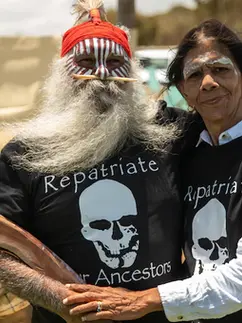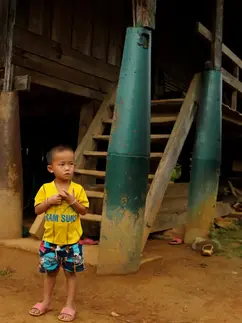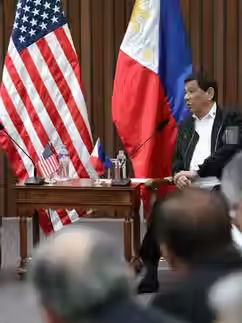Vanuatu disaster recovery: Aid diplomacy in the Pacific
Isabelle Zhu-Maguire

Vanuatu is used to wild, tropical weather. But this March, Vanuatu was flogged by back-to-back cyclones in just three days.
The cyclones caused flooding across the country. Hundreds of homes have been demolished and carried away by water. However, as residents started the recovery process - coming out of their emergency housing, clearing roads and restoring power - they were rocked once again, this time by twin earthquakes.
Whilst no lives have been lost, this series of disasters has left Vanuatu in a state of trauma. The ABC reported that 80 per cent of the country's population has been affected by these disasters, including 125,500 children. The initial estimate of the recovery cost is six billion Vatu, or just under $US 50 million.
Outside of these natural disasters, countries like Vanuatu find themselves in the middle of another storm - a geopolitical one.
Traditional and emerging donors all rushed to provide relief aid and supplies on the ground while the media looked on to tally up which donors pulled ahead.
FRANZ, a group made up of donor countries France, Australia, and New Zealand, provided the initial relief supplies following Cyclones Judy and Kevin two weeks ago. Australia sent a small Australian rapid assistance via aircraft, followed by HMAS Canberra with more than 600 Australian Defence Force personnel on board as well as humanitarian supplies. New Zealand also announced a package of relief supplies, including water containers, kits for temporary shelters, family hygiene kits and a financial contribution of $US94,000. US-ally, South Korea has also promised it will provide humanitarian assistance worth up to $US200,000 to Vanuatu.
Yet, it is the People’s Republic of China (PRC) that outshines the aid efforts from the other donor countries.
At news of the twin cyclones, the Government of China initially gave $US500,000 to aid recovery efforts in Vanuatu. This is on top of the $US100,000 donated by the Chinese Red Cross Society. Then, almost two weeks after the disasters, $US876,000 worth of crucial supplies arrived at Vanuatu’s shores courtesy of the PRC.
It should be understood that this aid was warmly welcomed by many. Initial aid was important but not nearly enough to fully recover from these disasters. Hence, China’s willingness to provide a second round of relief aid is potentially life-saving for some of the hundreds of thousands of Vanuatu residents impacted by these disasters.
While this aid is always welcome, we should not forget these donors have similar motivations and they are playing very similar political games. Each donor understands that if they were not to supply aid to Vanuatu in its time of need, their favorability in the country and the wider region would sour.
However, in the ‘West’ we get fed stories of a ‘villainous China’. That the People’s Republic of China is playing games with these Pacific countries. That China’s aid diplomacy only relies on cheap loans and debt traps. Yet, Vanuatu was given this relief aid with no strings attached. Even the debt Vanuatu owes China has reportedly been, in-part, forgiven.
Vanuatu has had 40 years of diplomatic relations with the People’s Republic of China. Yet as of late, the rhetoric of China’s military expansion in Vanuatu has exploded. Media outlets, with very little credible sources, have claimed that China is ‘eye-ing’ Vanuatu for a new military base. This is despite Australia having much closer military ties with Vanuatu - a recently signed, 2022 comprehensive security agreement signifying this closeness.
Given the state of high-alert the Australian media has imposed on many Australians regarding an ‘imminent’ war in the Pacific, it is hard not to look at Chinese aid without skepticism. However, we should not ignore that all donors are playing politics in one way or another.
Isabelle Zhu-Maguire (she/her) is a Master of International Relations student at Monash University. She is a youth network coordinator at UN's Sustainable Development Solutions Network and the founder of the Sustainable Universities Network (SUN). Isabelle has conducted research into gender and climate change as experienced by Afghan women as well as intervention in the Pacific from a Gramscian perspective.

















Comments